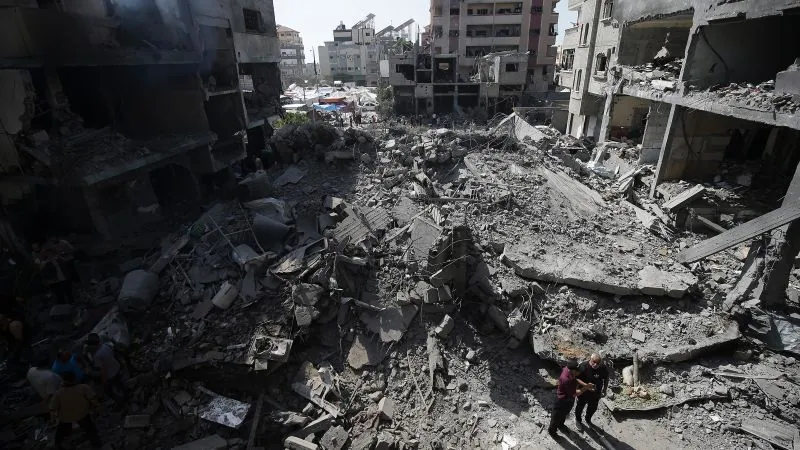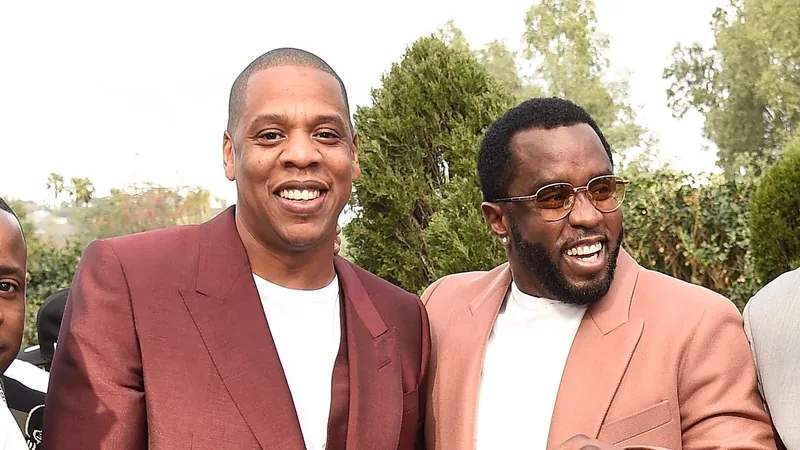
Hope Rises for Gaza Hostage Deal Amid Ongoing Negotiations
2024-12-17
Author: Emily
Overview
Hamas has recently joined the chorus of optimism surrounding the ongoing negotiations for a ceasefire and the release of hostages in Gaza, as diplomatic activities escalate in the region. In a statement released this Tuesday, Hamas declared that an agreement is "possible," signaling a more hopeful outlook amidst the turbulence of talks.
Diplomatic Progress
High-level diplomats from the United States, Israel, Qatar, and Egypt have issued statements over the past few days suggesting that tangible progress is being made in the negotiations. Although these officials have cautioned that no deal has been finalized, the positive rhetoric and recent diplomatic endeavors indicate a potential breakthrough.
CIA Director's Visit
Notably, CIA Director Bill Burns is anticipated to visit Doha, Qatar, this week to take part in the discussions, with sources indicating he could arrive as soon as Wednesday.
Challenges Ahead
Despite the budding optimism, Hamas has acknowledged that substantial hurdles remain. They indicated that Israel is apparently "imposing new conditions" on the negotiations, which could threaten the talks' momentum.
Indications from Hamas
In an official communication, Hamas stated: "The Islamic Resistance Movement Hamas affirms that in light of the serious and positive discussions taking place in Doha today, under the auspices of our Qatari and Egyptian brothers, reaching an agreement for a ceasefire and prisoner exchange is possible if the occupation stops imposing new conditions."
Negotiations Status
Both delegations from Israel and Hamas are currently engaged in indirect negotiations in the Qatari capital. Reports suggest that the Israeli delegation includes members from the Mossad and Shin Bet security services, marking one of the most intensive negotiation periods since discussions broke down in August.
Biden's Proposal
The framework for a potential deal is believed to be aligned with a proposal put forth by President Joe Biden earlier this year. This three-phase proposal would interlink a hostage release with a "full and complete ceasefire," aiming to unfold over an initial six-week period, during which Israeli forces would withdraw from populated areas in Gaza in return for the release of a number of hostages.
Initial Phase Complications
However, complications are already arising. An Israeli official hinted that troops may remain in certain areas of Gaza during this initial phase, particularly the Philadelphi corridor bordering Egypt, causing friction as Hamas insists on a complete withdrawal.
Gaps in Negotiations
A U.S. official emphasized that while the current round of negotiations appears to be more productive than previous encounters, significant gaps still exist between the two parties.
Involvement of U.S. Officials
The recent diplomatic surge has also involved U.S. National Security Adviser Jake Sullivan enhancing talks with stakeholders in Israel, Egypt, and Qatar last week, with the aim of finalizing a deal this month. Meanwhile, Brett McGurk, a senior advisor to Biden, remains in Doha, indicating the administration’s commitment to achieving peace in the region.
Casualties in Gaza
The backdrop of these negotiations includes significant events that have positioned Hamas in a vulnerable state following the recent killing of its leader Yahya Sinwar and other Israeli military successes. Since the onset of hostilities on October 7, 2023, the death toll in Gaza from ongoing Israeli military operations has surged to nearly 45,000, with over 106,000 reported injuries according to Gaza’s health ministry.
Trump's Influence
Amid these pressing circumstances, President-elect Donald Trump's potential influence on the negotiation process cannot be overlooked, as he has reportedly pushed Netanyahu towards making concessions, warning that "there would be all hell to pay" if hostages are not released before his inauguration. Trump's administration's close coordination with the Biden administration has been pivotal in global efforts to secure a resolution.
Cautious Optimism
As discussions continue, U.S. State Department spokesperson Matthew Miller expressed a "cautious optimism tempered by realism," reiterating that while there are bridging opportunities, there remain many unresolved issues. He stressed the necessity for both Hamas and Israel to make decisions to ultimately reach a peace agreement.
Potential Obstacles
Yet, fears linger. Veteran Israeli negotiator Gershon Baskin remarked, "There is no deal until there is a deal," and pointed out that although Hamas has expressed readiness for reconciliation since September, the complexities of the situation, including public dissent against Hamas's leadership and Israelis' demand for troop presence, pose significant challenges to conclude negotiations satisfactorily.
Netanyahu's Stance
Israeli Prime Minister Netanyahu has reiterated a firm resolve not to cease military operations until Hamas is decisively defeated, suggesting that even if a temporary agreement is reached, the conflict may reignite once hostages are released, leaving a delicate path ahead for all parties involved.









 Brasil (PT)
Brasil (PT)
 Canada (EN)
Canada (EN)
 Chile (ES)
Chile (ES)
 España (ES)
España (ES)
 France (FR)
France (FR)
 Hong Kong (EN)
Hong Kong (EN)
 Italia (IT)
Italia (IT)
 日本 (JA)
日本 (JA)
 Magyarország (HU)
Magyarország (HU)
 Norge (NO)
Norge (NO)
 Polska (PL)
Polska (PL)
 Schweiz (DE)
Schweiz (DE)
 Singapore (EN)
Singapore (EN)
 Sverige (SV)
Sverige (SV)
 Suomi (FI)
Suomi (FI)
 Türkiye (TR)
Türkiye (TR)